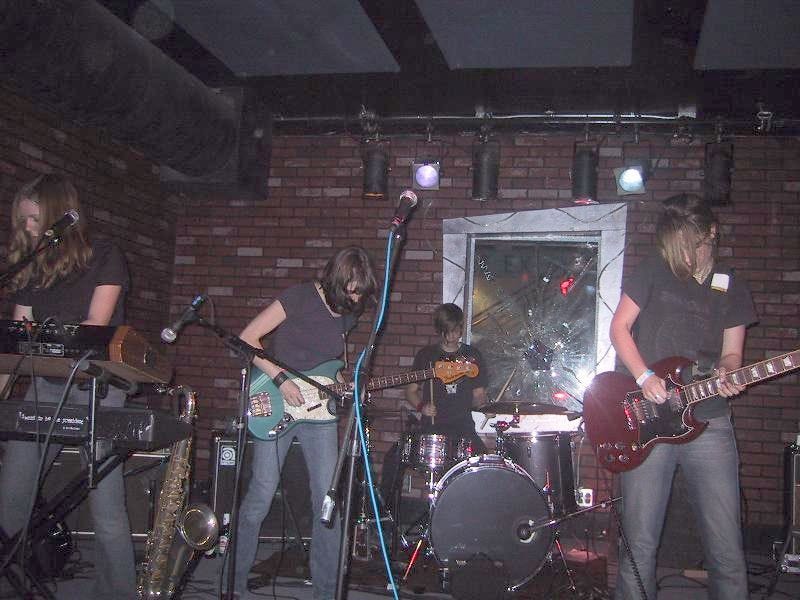hands up! a traversal of electrelane
brighton's forgotten all-woman band of the early 2000s, revisited
From the greyness of March 2024 emerged not only the early signs of spring, with all the chickadees and black-throated blue warblers out to remind us that Manhattan, too, sits on God’s green earth, but also the brackish and unambiguous truth that I was in my final few months in America after nearly five years living there. What could be the appropriate soundtrack for leaving my friends, my work, the only adult life I knew, to return to my hometown in Britain? I was living in New York at the time, so all year I’d been listening to LCD Soundsystem, of course, and Biggie, and so much Talking Heads. But with the start of spring came the need for something different, something warm and salubrious, forgiving enough to let me ride out the doom but zealous enough to pull me out of it. Ultimately, this came in the small, spirited form of Yo La Tengo. I was carried through those last months by Painful (1993) and I Can Hear The Heart Beating As One (1997). After my tearful farewells, I boarded the one-way flight to London and listened to The Lie And How We Told It.
I have not been able to listen to Yo La Tengo since being back in Britain. It reminds me too much of leaving. But I’ve been craving music with a similar gauziness, something that might inundate my parents’ house in Birmingham with the sentimentality of the 2 train back to my apartment at 3am, just me and my headphones and a few pairs of drooping eyes and the comforting warble of the largest thing around also being the most unassuming. Maybe that is exactly the sentiment of being back in your parents’ house. In any case, I wanted distorted, overdriven bass, searing romance, spare lyricism. I got it all. I got into Electrelane.
I do not feel the need to restate in new words what has already been aptly expressed. As Zachary Lipez of Abundant Living says, “Electrelane are largely unsung.” Immediately justifying the references to The Velvet Underground and Stereolab that populate any online mention of them, Electrelane is all rippling guitar and discordant vocals, barely intelligible among repeating riffs which deftly build up the tension leading us into long, dizzying outros. And everyone knows Ahlaam loves a long outro. Electrelane’s The Power Out (2004) and No Shouts, No Calls (2007) are two albums which truly feel like formative discoveries of my adult life so far.
Founded by Verity Susman in 1998, the all-woman Brighton-based indie rock band rotated members throughout its lifespan but most steadily featured Susman, Emma Gaze, Mia Clarke, and Ros Murray. Their debut album Rock It to the Moon was released in 2001 under Mr Lady Records (Le Tigre, The Butchies), receiving an 8 out of 10 from NME, describing the band as “four Stoogettes on a mission to play like Broadcast with a rocket stuffed up their portable transceivers.” I am a Brummie, meaning Broadcast has been important to me since I was teenager. Discovering Electrelane on my return has been close to serendipitous — it is entirely new, entirely familiar.
I am unsurprised by the writing I’ve found about Electrelane’s music from the years the band was active; although well-received, there seeps the classic industry condescension dedicated to writing the band off as derivative, as though Electrelane is the first band to have been clearly inspired by Sonic Youth. It stands out to me that it is an all-woman band in discussion. If I was inclined to humour the phrase, which I am decidedly not, I might describe myself as the friend who is too woke. I digress. Electrelane operates in ambiguity, which is reflective of my own personal methodology, but the group is striking in its decision-making. The Power Out was recorded by Steve Albini, icon of the underground who passed away last year, and is a particularly textural album, featuring songs in French, Catalan, and German. The lyrics to ‘This Deed’, eighth track on the album, comprises a single repeated German line from Friedrich Nietzche’s The Gay Science, compounding in intensity as the instruments layer and the loop expands, culminating in a piercing, abrupt exclamation: “hände hoch!” — “hands up!”
I find Electrelane compelling for many reasons. Some of them personal, in that I am individually drawn to a post-punk sensibility which concedes to the romance of a feedback-driven track, letting the intensities of layered distortion attend to its natural, rather tender, conclusions. It is the music equivalent of movies where people walk around and talk a lot. A sweetness is retained even in the band’s more varied work, bringing in banjos and choirs and moments of complete silence for sonic experiences I might dote over. I find such charm in a track like ‘You Make Me Weak At The Knees’, which embodies an almost jazzy, twinkling, youthful joviality. Electrelane is hard to pin down, and while I think this might’ve been a contributing factor to their under-reception, I consider it one of their foremost strengths.
The gods of notoriety did not grant Electrelane what I believe to be their due. They have 135, 740 monthly listeners on Spotify. Their most-streamed song 'Birds’ has a humble six million listens. In a contemporary music landscape which favours solo acts over bands, I’m attempting to consciously balance my interest in and engagement with the new vogue with an exploration of what we might’ve missed along the way. Women are, in general, expected to be solo acts. That Electrelane comprised such a taut unit in a genre that is, even for the music industry, so difficult to touch, makes them worthy of our retrospective attention. And I’m grateful I discovered the group in a moment where I’m looking for music that cuts right into the lung of distance; this is music that is at once very close and very far.


